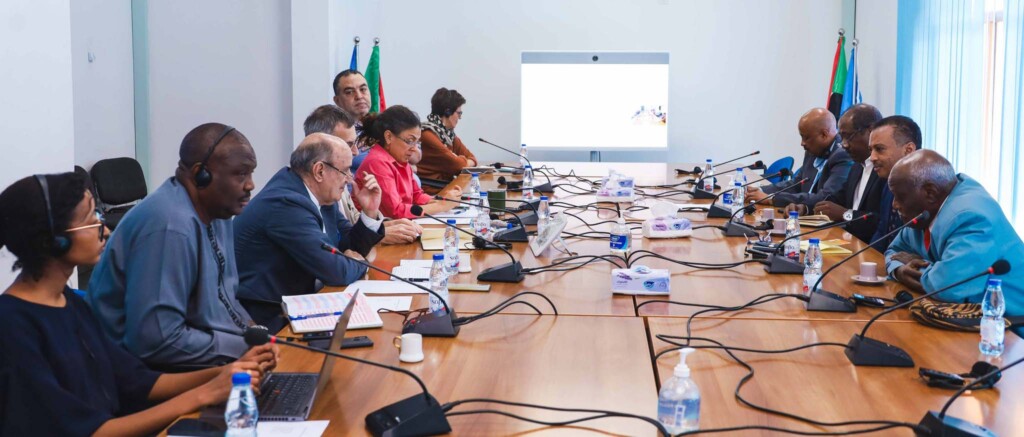Demonstrations planned in Khartoum as FFC signs deal with Sudan’s military junta
The Forces for Freedom and Change-Central Council (FFC-CC) confirmed on Sunday that it has agreed to sign the first phase of a political framework agreement at the Republican Palace in Khartoum at 10:30 today.
 Meeting with the AU-IGAD-UN Trilateral Mechanism in Khartoum on November 30 (Photo: UN Photo)
Meeting with the AU-IGAD-UN Trilateral Mechanism in Khartoum on November 30 (Photo: UN Photo)
The Forces for Freedom and Change-Central Council (FFC-CC) confirmed on Sunday that it has agreed to sign the first phase of a political framework agreement at the Republican Palace in Khartoum at 10:30 today, meanwhile demonstrations against the deal are set to take place in the Sudanese capital.
According to sources, the various political parties and groups will each separately sign the framework agreement, witnessed by the AU-IGAD-UN Trilateral Mechanism.
This weekend, invitations to attend the signing of the first phase of the agreement from the Secretary-General of the Transitional Sovereignty Council, Gen Mohamed El Ghali, circulated on social media.
FFC-CC spokesperson Jaafar Hasan told Radio Dabanga that he does not expect any delay to the set date. In contrast, the Justice and Equality Movement and the Sudan Liberation Movement faction of Minni Minawi proposed to postpone the signing in meetings with FFC representatives on Saturday. The two groups may sign the framework agreement later, according to Hasan.
He said that they spoke with the two rebel groups only. The FFC-CC did not speak with the FFC-Democratic Block (FFC-DB), which includes the National Accord Forces (NAF), the Democratic Unionist Party (DUP), and the Sudanese Ba'ath Party, amongst others.
'No negotiation’
Coordination teams of resistance committees in Khartoum announced that demonstrators will march to the Republican Palace today to protest the signing of the framework agreement.
Grassroots groups in various press statements confirmed their adherence to the slogan of the revolution: “No negotiation, no partnership, no legitimacy” with the military over the weekend.
In a statement issued by its Political Bureau on Saturday, the Communist Party of Sudan said that the framework agreement “is a domestic and foreign conspiracy to block the path of the revolution.” The party called “on all its members, allies, and all forces of the revolution to join the marches on mass.”
The party stated that the framework agreement “aims to reproduce the former regime in a new version to preserve the interests of parasitic capitalism and its allies abroad.” The Alliance for Radical Change, formed earlier this year by the Communist Party, issued a similar statement.
Party positions
In a statement on Sunday, the FFC-Beja Congress Party called on “all forces in eastern Sudan to sign this declaration to complete the process of restoring civilian rule.”
The party has signed the draft of the transitional constitution, developed by the Sudanese Association in August, according to the statement.
Many political parties and groups denounce the contents of the framework agreement, among them members of the FFC-CC who have left the alliance.
The Darfur Bar Association (DBA) also rejects the framework agreement as its members consider it “a deviation from the path of restoring the constitutional life of the country, an entry point for power-sharing between its signatories, and the legalisation of impunity of the security apparatus of the ousted regime [of Omar Al Bashir].”
The DBA said in a statement yesterday that the draft framework “will plunge the country into new disputes and political and security chaos.”
Ammar Daldoum, Secretary General of the Sudan People’s Liberation Movement-North under the leadership of Abdelaziz El Hilu in the Nuba Mountains, also criticised the transitional constitution text because it “does not address the roots of the Sudanese problem.”
According to Daldoum, political alliances such as the FFC-CC “do not care about the core issues and political and economic stability. Their priorities are the seats of power only.”
He said in a speech to the SPLM forces on Sunday that the Trilateral Mechanism does recognise the importance and active role of the movement as a major force in the political scene.
‘Effective communication’
To expedite the agreement to form a new civilian government as soon as possible in Sudan, the AU-IGAD-UN Trilateral Mechanism proposed to postpone talks on four important and contentious issues; justice and transitional justice, security and military reform, empowerment removal*, and the Juba Peace Agreement have been postponed for the final agreement.
In an interview with Radio Dabanga this weekend, El Wasig El Bereir, Secretary-General of the National Umma Party (NUP) and spokesperson for the FFC-CC said that the signing of a final agreement with the junta will take place within three to four weeks.
Gen Mohamed ‘Hemeti’ Dagalo, Commander of the Rapid Support Forces (RSF) and Vice-President of the Sovereignty Council, stressed the “need for effective communication between the FFC-CC, the FFC-DB, and the other signatory parties to the framework agreement” during a meeting with the Democratic Block on Sunday.
Kholood Khair, broadcaster and managing partner of Insight Strategy Partners, tweeted on Saturday that “no one knows conclusively what they would be supporting, the omerta around the deal is troubling. Confidence in the deal and in phase two (far more difficult phase) will rely on trust. Trouble is, trust is the rarest commodity in Sudan's political marketplace today.”
According to the political commentator, the “opaque and regionally porous” nature of the framework agreement draws a line between forces supporting El Burhan and forces supporting Hemeti, rather than between pro- and anti-coup forces.
“This can only heighten the stakes for an armed confrontation between the RSF and Sudan Armed Forces, particularly as this deal will give each side more to play for during phase two, when Sudan's political crisis may well begin in earnest,” she said.











 and then
and then